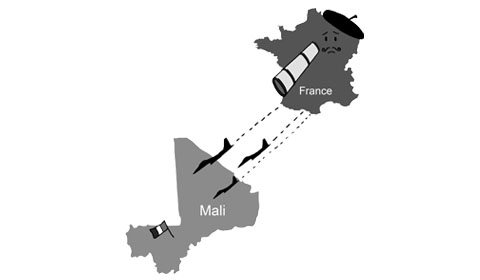
On Jan. 10, insurgent forces in Mali seized the city of Konna, which is less than four hundred miles from the capital city of Bamako. This was only the latest in a series of aggressive actions by disparate groups of rebels who, following their joint 2012 declaration of independence from the government, seized a significant amount of territory in northern Mali, including key cities such Kidal, Gao and Timbuktu.
To avoid allowing the northern territory to become a potentially anarchic breeding ground for terrorism, France deployed troops the following day, as the weakened Malian army in Bamako was unable to maintain stability. The French government has acted in their own self-interest in attempting to secure the stability of their former colony, where they still have significant commercial interests. However, now that it has intervened, France has a responsibility to mediate a solution, and they must address the causes of this conflict, rather than merely putting down its symptoms.
In many ways France’s Operation Serval, whose goal is the total elimination of militant Islamist forces in northern Mali, has been successful. With military and financial support from countries such as Chad, Spain and the US, French and Malian forces have successfully retaken significant portion of northern Mali, including the area between the cities of Gao and Timbuktu and the vital city of Konna. To the residents of these newly recaptured cities, the French military offensive ended the three-month-long oppressive regime imposed by the insurgents, whose attempts to impose a harsh version of Islamic law included the stoning of a couple accused of having children out of marriage and the amputation of the hand of an accused thief.
But the celebration of recent victories threatens to overshadow the causes of this conflict: the animosity between the Malian government in the south and the ethnic minority that resides in the contested territory of northern Mali, the Tuareg. For decades, Tuareg leaders have claimed that Tuaregs in both Mali and neighboring Niger suffer from marginalization, forced modernization and poverty at the hands of the government. Without a resolution of these tensions and the formation of a stable structure to manage said tensions, France’s military success might become only another battle in an even longer war between a France-backed government and the insurgents.
The territory formerly controlled by the insurgency is officially titled the state of Azawad by the insurgents, although the state is unrecognized by the global community. In January 2012, the National Movement for the Liberation of Azawad (MNLA), composed chiefly of the Tuareg, declared its independence from Mali, a struggle which gained momentum for the Arab Spring. The MNLA struggle from independence has been further complicated by their cooperation with the militant Islamist group Ansar Dine, which in turn has possible ties to Al-Qaeda in the Islamic Maghreb, an extremist, Mali-based Islamic militant organization. Although MNLA is a secular group and Ansar Dine’s primary goal is to install a stricter Islamic code throughout Mali, the two organizations joined forces to promote the creation of an independent state in the north.
Already, the conflict in Mali has led to political instability in the capital; in March 2012 a military coup seized power, allegedly over the former government’s handling of the growing Tuareg dissent.
By intervening in Mali, the French government has entered a complex situation, which has spread political instability and ethnic tensions throughout North Africa. Although the actions of French and Malian forces have saved lives and communities from an oppressive regime, this alone is not enough to end the history of conflict between the Malian government and the Tuareg, dating back as far as the 1916 Kaocen revolt against French colonial rule. Rather, the French government must now mediate relations between the current government, the MNLA and Ansar Dine with the hopes of creating stable political structures that will stand long after foreign troops have retreated.



